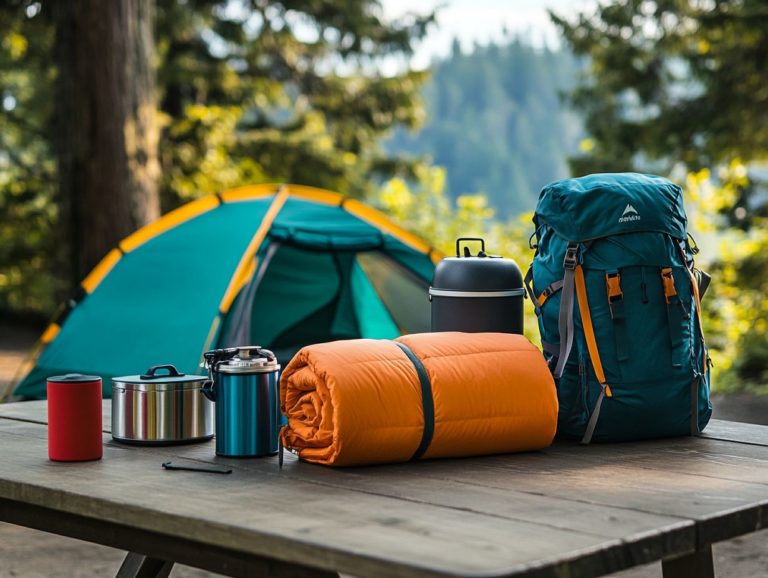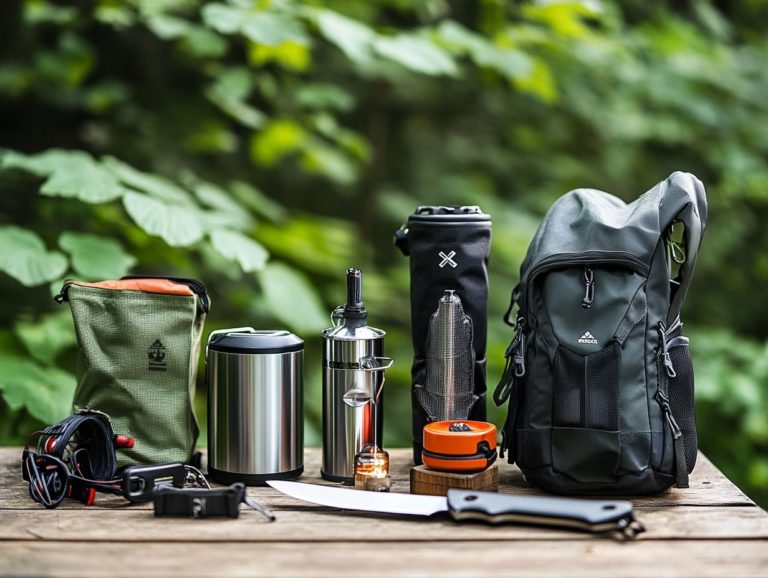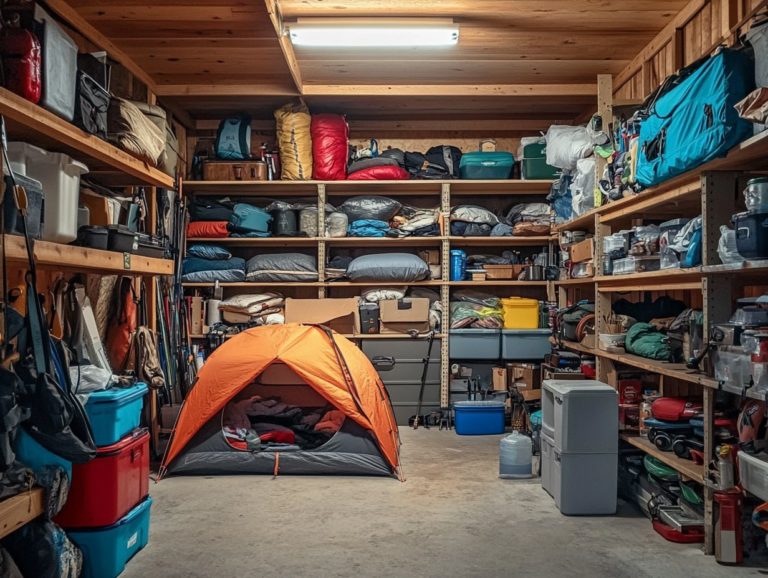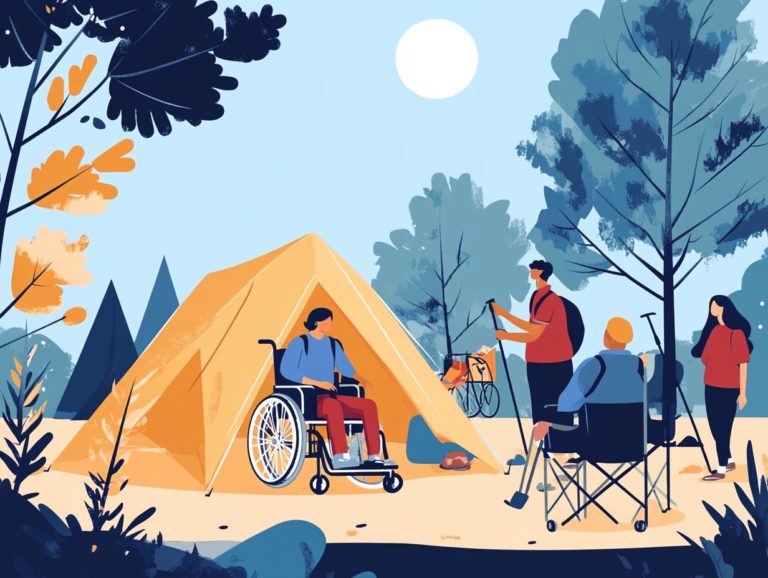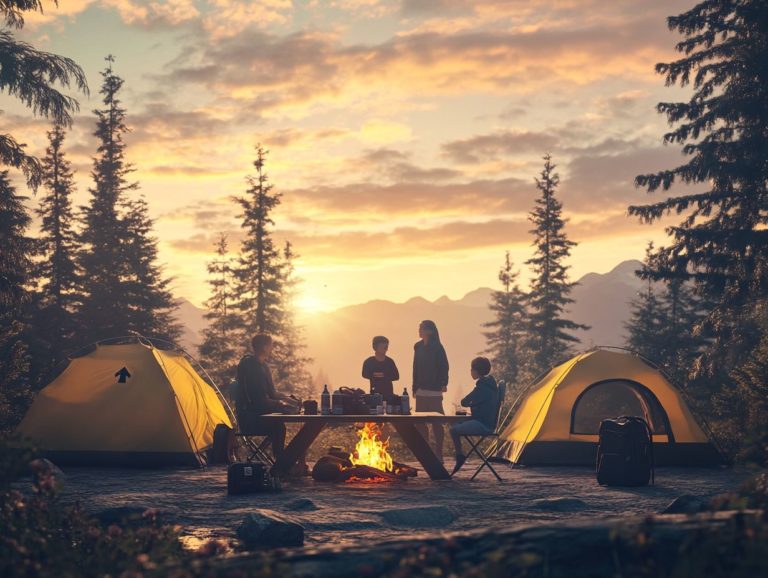Camping Etiquette: Dos and Don’ts
Camping offers a cherished getaway for you, providing a perfect opportunity to connect with nature and escape the daily grind on your next camping trip.
To truly savor the great outdoors, good camping manners are important, especially when considering camping rules and safety concerns. This not only enriches your own experience but also shows respect for the environment and your fellow campers.
From adhering to the Leave No Trace principles, which are guidelines to protect nature by leaving minimal impact, to practicing proper waste disposal and ensuring campfire safety, grasping these essential guidelines can elevate your outdoor adventure and make it more enjoyable for everyone involved.
Let s explore this essential guide to uncover the key dos and don’ts of camping etiquette, ensuring you enjoy a harmonious experience in nature.
Contents
Key Takeaways:
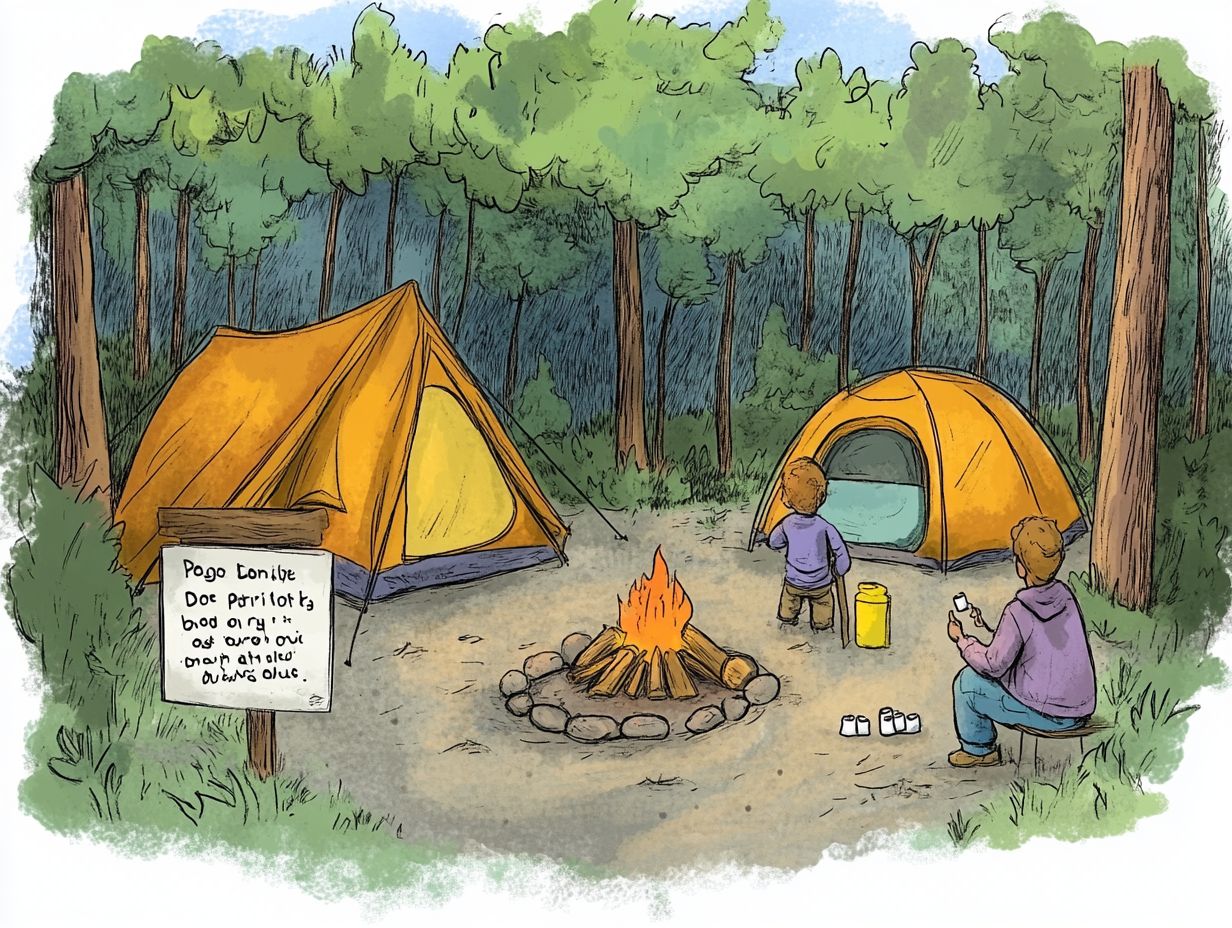
- Always follow the Leave No Trace principles to minimize your impact on the environment and preserve the beauty of nature for wildlife and future campers.
- Respect other campers by being mindful of noise levels and campsite boundaries, particularly during quiet hours. Share common spaces and be considerate of others’ camping experience.
- Practice responsible camping by following safety precautions and fire regulations, as well as being self-sufficient and minimizing your impact on the environment.
Why is Camping Etiquette Important?
Good camping manners help everyone enjoy their outdoor adventure, including camping with kids. By respecting camping rules and fostering a sense of community among fellow campers, you enhance your own experience while also protecting the environment and wildlife. This is essential for both newcomers and seasoned campers alike.
When you embark on a camping trip, practicing good manners and respect can lead to delightful interactions and cherished memories in the great outdoors. Additionally, it’s vital to keep in mind essential camping safety tips to ensure a safe and enjoyable experience.
To cultivate a warm atmosphere, greet your neighbors with a friendly wave and be mindful of noise levels, especially during those early mornings or late evenings when silence is golden. If you’re camping with kids, teach them the importance of adhering to safety rules and not disturbing wildlife; these lessons can instill a sense of responsibility they’ll carry with them.
Always throw away your trash properly and respect designated camping areas. This not only preserves the natural beauty around you but also fosters a collective commitment to cleanliness. Respectful behaviors can transform your solitary trips into a cohesive community experience, where everyone feels truly at home in the embrace of nature.
Respecting the Environment
Respecting the environment while camping is essential; it ensures that natural habitats remain intact for future generations and that your experience is both enjoyable and responsible.
By adhering to ‘Leave No Trace’ principles, practicing proper waste disposal, and utilizing eco-friendly camping supplies, you can significantly minimize your impact on the wilderness and help preserve its beauty.
Keeping your campsite clean not only contributes to the overall health of the environment but also enhances the experience for everyone visiting national forests and campgrounds.
Leave No Trace Principles
The Leave No Trace principles offer a refined set of guidelines that focus on minimizing your impact on the environment during outdoor adventures, particularly camping trips, while ensuring you are prepared with essential tools. By adhering to these principles, you can respect your natural surroundings, keep wildlife safe, and maintain the integrity of your campsite. Key aspects include:
- Planning ahead
- Traveling on durable surfaces
- Properly disposing of waste
These principles act as a blueprint for crafting memorable and responsible outdoor experiences, especially when camping with children or in larger groups.
When planning a family camping trip, involve the kids in choosing an already established campsite, protecting pristine areas from unnecessary wear. Teaching them the significance of staying on marked trails not only preserves the environment but also deepens their appreciation for the beauty of nature.
Utilizing designated disposal methods for waste, like packing out trash and employing portable toilets, can help instill lifelong habits in young campers. Emphasizing these practices nurtures a sense of responsibility and stewardship towards the natural world, ensuring that each outing leaves nothing but footprints behind.
Proper Waste Disposal
Keeping your campsite clean is crucial for a great camping experience! Proper waste disposal ensures both the cleanliness of your campsite and the safety of local wildlife. Always use portable toilets whenever possible and follow guidelines for food storage to avoid attracting curious critters like raccoons and bears.
Utilizing trash bags to gather all waste, including biodegradable items, is crucial for minimizing your impact on the environment. Every small choice counts choose eco-friendly products to protect our planet today!
Implementing effective food storage practices like using bear-proof containers and keeping all items sealed does more than just keep your campsite tidy. It protects local wildlife, ensuring that your camping trip is both enjoyable and responsible. These precautions help preserve natural habitats, keeping them vibrant for future visitors to enjoy.
Consideration for Other Campers
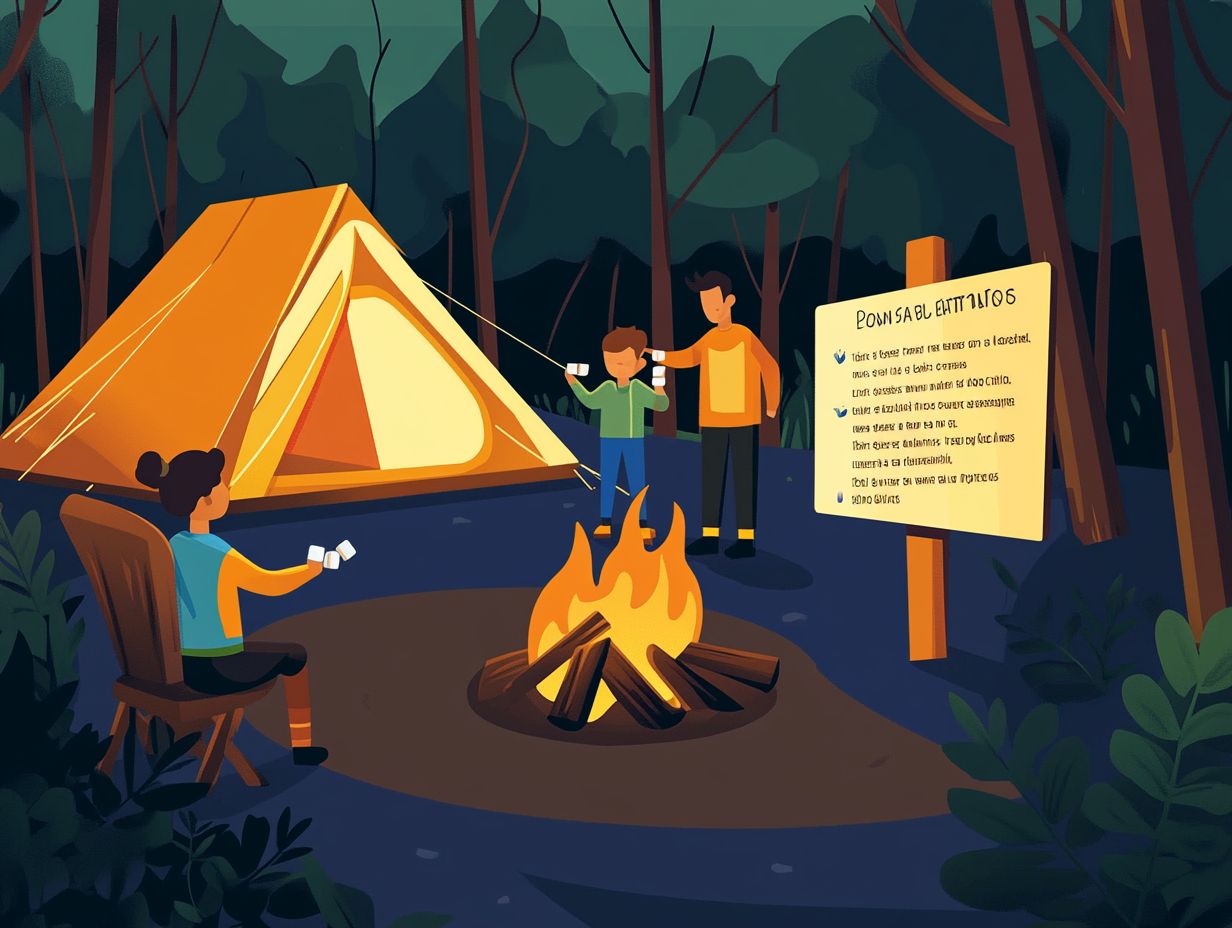
Consideration for fellow campers is an essential element of camping etiquette that cultivates a harmonious atmosphere in shared spaces. By maintaining appropriate noise levels and respecting quiet hours, you significantly enhance the overall camping experience for everyone, particularly families and those seeking a tranquil retreat.
Paying attention to your camping neighbors fosters a sense of community and mutual respect among fellow outdoor enthusiasts.
Noise and Campsite Boundaries
Managing noise levels at your campsite is crucial for creating a pleasant atmosphere for everyone, especially during sacred quiet hours when camping etiquette should be prioritized. By respecting the boundaries of your campsite and being mindful of your sound, you contribute to a peaceful environment that allows everyone to enjoy nature without interruptions.
Establishing specific quiet hours, typically between 10 PM and 7 AM, cultivates a culture of respect among campers. When gathered around the fire with friends sharing stories, keeping the laughter at a manageable level ensures you re not disturbing those winding down for the night.
It s wise to communicate with your group about sound plans. Designating a quiet zone for games or conversations can create a balance where fun and tranquility coexist harmoniously.
Remember, considerate interactions not only enhance your own experiences but also foster camaraderie among fellow campers, making the outdoors enjoyable for everyone.
Sharing Common Spaces
Sharing common spaces at a campsite is vital for the camping community. It enriches your experiences and nurtures camaraderie among fellow campers while adhering to campsite rules.
When everyone follows the campsite rules and embraces good camping etiquette, amenities like fire pits, picnic tables, and shared cooking areas become enjoyable and accessible.
Recognizing the value of cooperation can lead to memorable interactions during your camping adventures.
To maintain a harmonious atmosphere, be mindful of your noise levels, especially during quiet hours. Consider how you use shared spaces for various camping activities.
For example, organizing group meals or fun games like frisbee or volleyball can unite everyone. Check in with nearby campers to ensure you re not crowding their area.
Respecting shared responsibilities, like cleaning up after a gathering, fosters goodwill. Simple gestures, like helping someone with their gear, create a welcome environment and make everyone feel appreciated.
Campfire Etiquette
Campfire etiquette is essential for safety and enjoyment during your camping trip. Whether you’re cooking over a fire or following firewood regulations, knowing the rules enhances your experience.
By sticking to fire safety rules, you protect yourself, fellow campers, and local wildlife. Understanding responsible campfire practices ensures safety and contributes to a memorable adventure.
Safety Precautions and Fire Regulations
Understanding safety precautions and fire regulations is essential for responsible camping. Managing campfires and understanding their potential hazards is crucial.
Follow local firewood regulations and use the right camping tools to prevent accidents and protect wildlife.
Prioritizing safety enhances your camping experience and allows you to enjoy nature fully.
Fire safety begins with knowing what types of fires are permitted in your camping area. Some places may have restrictions during dry seasons.
Always source your firewood locally. This minimizes the risk of spreading pests and diseases that threaten local ecosystems.
Investing in tools like fire extinguishers, shovels, and water containers is wise for managing your campfire. Keep a safe distance from tents and surrounding foliage to prevent mishaps.
Responsible Camping Practices
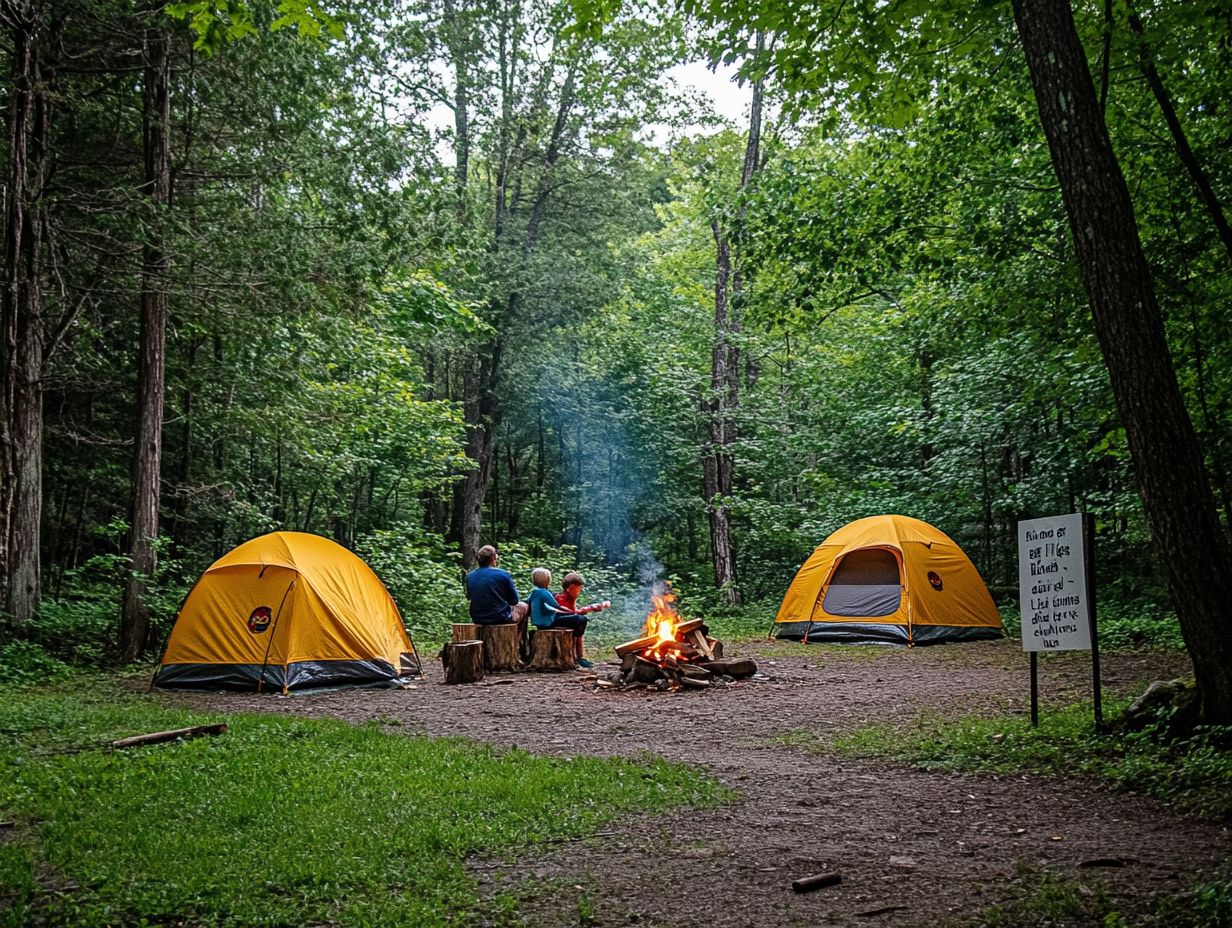
Responsible camping practices are essential for preserving the beauty of nature during your outdoor adventures. Minimize your environmental impact and equip yourself with the necessary tools for enjoyable and sustainable experiences.
Embracing these practices shows your respect for the environment and enriches the experience for everyone in the camping community.
Key Takeaways:
- Follow campsite rules and respect shared spaces.
- Practice safe campfire management.
- Source firewood locally to protect ecosystems.
- Keep communal areas tidy and offer help to fellow campers.
Let s make our camping trips enjoyable and safe for everyone!
Minimizing Impact on the Environment
Minimizing your impact on the environment should be at the forefront of your camping priorities. This preserves the natural beauty and ecosystems that make outdoor adventures truly worthwhile.
By selecting the right camping supplies and adhering to established camping rules, you can significantly reduce your impact on the environment while still savoring every moment of your experience.
Implementing strategies such as effective food storage and proper waste disposal is essential for maintaining campsite cleanliness. This ensures the safety of local wildlife.
Using biodegradable products helps reduce single-use plastics, which often find their way into nature. It’s also wise to familiarize yourself with local regulations regarding waste disposal. Opting for designated trash receptacles or planning to pack out all your waste will go a long way in protecting the environment.
Be mindful of wildlife: avoid leaving food exposed and maintain a safe distance from animals. This keeps you safe and safeguards the creatures that inhabit these areas. To enhance your outdoor experience, it’s also important to follow hiking etiquette: do’s and don’ts. Ultimately, making conscious choices about your equipment and practices helps preserve the environments that outdoor enthusiasts hold dear.
Being Prepared and Self-Sufficient
Being prepared and self-sufficient is essential for a successful camping trip. This ensures you re equipped to handle any situation that may arise during your outdoor adventure.
By packing the right camping gear and essential tools, and following key safety tips, you can confidently tackle challenges while relishing your time in nature.
A solid understanding of the camping environment and its potential hazards will enhance your readiness and boost your confidence.
For instance, organizing your gear in clearly labeled bags can save you precious minutes when unexpected rain hits or when you re setting up in the dark.
Don t skip packing a first-aid kit it could save the day! Make sure it includes any necessary medications, as injuries can occur in remote areas where medical assistance isn t just a phone call away.
Checking the weather forecast before you head out is equally vital. Knowing whether to expect rain, sweltering heat, or a sudden chill can guide your clothing choices and help determine the types of food you should pack.
Imagine a scenario where sudden thunderstorms roll in. Waterproof gear and a reliable shelter become imperative, making the difference between an exhilarating adventure and an uncomfortable ordeal.
Frequently Asked Questions
What is camping etiquette?
Camping etiquette refers to the unwritten rules and guidelines that campers should follow to ensure a positive and respectful experience for everyone in the campground.
What are some general dos and don’ts of camping etiquette?
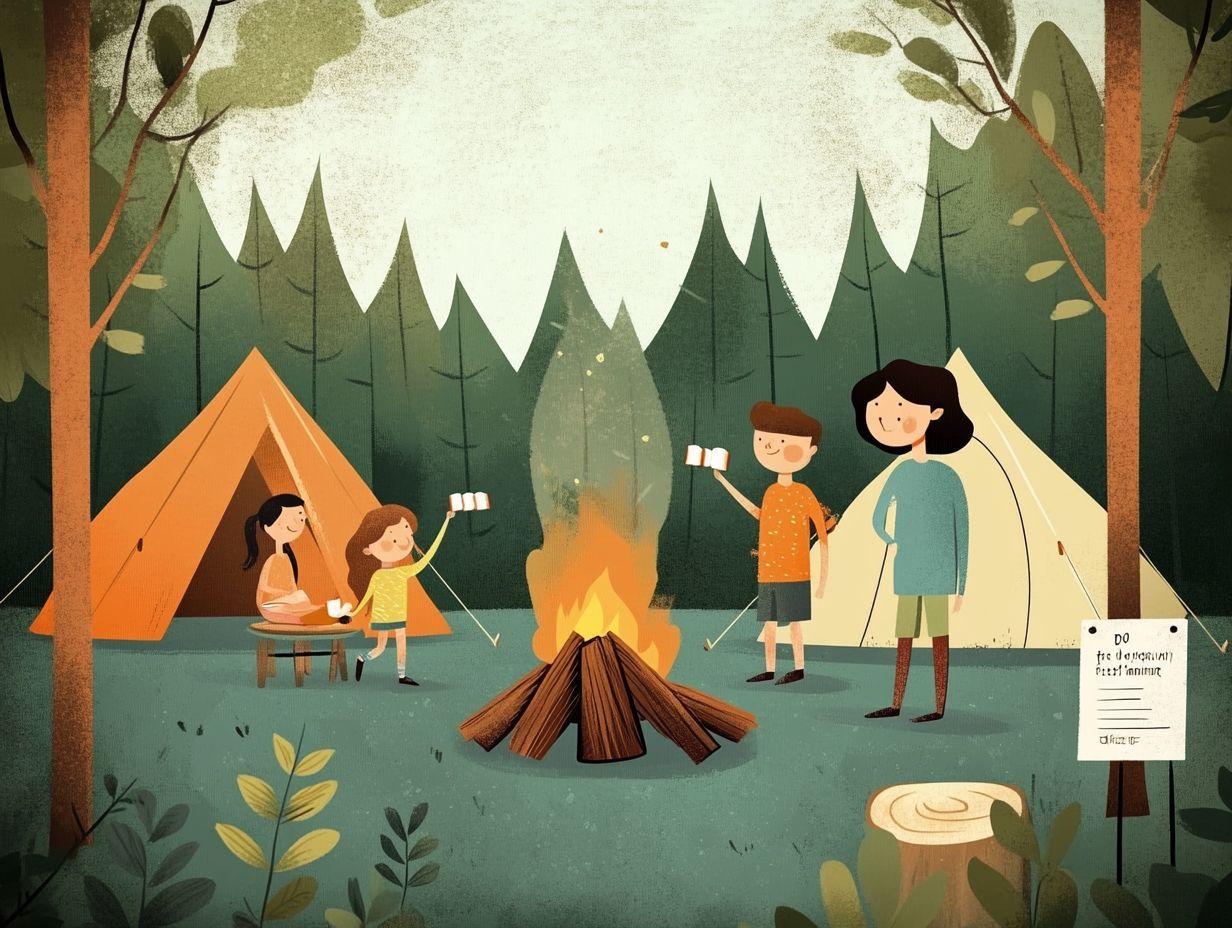
Do: Respect your fellow campers and their space, properly dispose of trash and keep your campsite clean, follow campground rules and regulations, and be considerate of noise levels.
Don’t: Be loud and disruptive, leave garbage or waste behind, ignore campground rules, or disturb wildlife.
Is there a specific way to set up a campsite?
Yes, when setting up your campsite, be mindful of designated areas and boundaries. Make sure to not encroach on your neighbor’s space and keep your belongings within your designated area.
Avoid setting up camp on fragile vegetation or near bodies of water.
What should I do if I encounter wildlife while camping?
If you encounter wildlife while camping, it is important to keep a safe distance and not approach or feed them. Respect their natural habitat and do not leave any food or trash out that may attract them.
If you are in a designated area with bears, be sure to properly store your food and any scented items in bear-proof containers.
Is it okay to have a campfire while camping?
Campfires can be a great part of camping, but it is important to follow campground rules and regulations regarding them. Be sure to only have fires in designated fire rings, properly extinguish them before leaving the campsite, and never leave a fire unattended.
Also, be aware of any fire bans or restrictions in the area.
What is the best way to handle conflicts with other campers?
If you encounter a conflict with another camper, communicate calmly and respectfully. Get help from a campground staff member or park ranger if needed.
Always be considerate of your fellow campers. This helps prevent conflicts before they start. Conflict can ruin your camping experience handle it wisely to enjoy the great outdoors!

